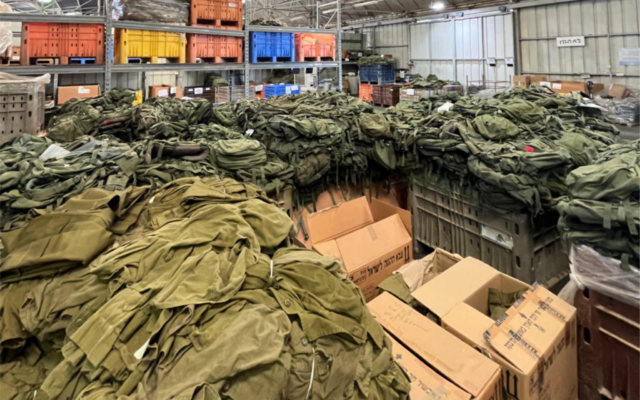Israel on the Domestic Front -- At War
"People are hysterical. Companies are not able to provide supplies.""Their Jewish workers have been called up to reserves or are afraid to come out.""The Arab workers are afraid to come out."Michael Rabani, 40, Israeli-Palestinian, owner of two Jerusalem grocery shops
At
Jerusalem's Malha Mall, a popular shopping spot, the parking lot is
almost empty. Makes sense, since almost every mall shop is closed. Not
only at this mall, but across the country. And for a simple enough
reason, life in Israel has been turned upside-down, inside-out. Where
employees who would under normal circumstances be working in the shops
are answering the call for reservists and others to report to the
military.
 |
| Uniforms and protective vests being prepared for distribution to reserve soldiers, October 10, 2023. (Israel Defense Forces) |
The
transformation from a country at peace to one at war after the deadly
surprise attack that the Hamas terrorist group sprang on Israel's
southern communities close to the Gaza border had an immediate effect.
Five days ago the population was busy in its normal routine, people at
offices unsuspecting they would soon be back in uniform -- an estimated
360,000 at final count in one of the largest mobilizations in Israel's
brief history. Schools have been closed, and local governments are
attempting, even as their workforces dwindle, to provide services.
"We're working under fire now, but we have no choice",
explained Shaul Schneider, executive chairman of Ashdod Port, Israel's
largest where over eight percent of its staff have left to report to the
army. Leaving the port authority to call in retirees so cargo can move.
When Hamas rockets screech overhead, at times ten daily, crane
operators hope for the best. "Unfortunately", said Mr. Schneider, "Israel has experience in such situations".
 |
| Empty produce shelves at a Machsanei Hashuk supermarket in Jerusalem, on October 10, 2023. (Amy Spiro/Times of Israel) |
Streets
that would in normal circumstances be full of honking traffic, are now
still and quiet prevails. Jaffa Street in Jerusalem, popular as a
shopping street, appears like a ghost town, lined with flashing police
cars. Palestinian labourers who ordinarily work at construction sites
have been prohibited entry from the West Bank, so construction sites are
shuttered.
The
shopping that is taking place is that of families anxious to stock up
on essentials. The military Home Front Command instructed Israelis to
equip their bomb shelters and basements with several days of supplies.
Residents of apartment buildings have been instructed to remove bicycles
and personal items from safe-rooms and instead stock them with
emergency provisions.
 |
| Goods donated by supermarket chain Shufersal await distribution, in a photo released on October 10, 2023. (Courtesy) |
Israel's
largest supermarket chain, Shufersal, as shelves began to empty took
the step of limiting sales of basics to two packs of water, two cartons
of eggs, two loaves of bread and three containers of milk for the time
being. Palestinians living in Israel have been making themselves as
invisible as possible as preparations for war proceed. They can feel,
they say, the fury in Israel, directed at Hamas.
 |
| Group of American and British teenagers who came to Israel to join the army. Ivana Kottasova/CNN |
Twenty
kilometres' distance from reservists gathering outside Julis military
base near Ashkelon, air force planes were bombing the Gaza enclave,
likely to become the target anew of an imminent ground war. "It's a big change, but for us very natural. When you live in Israel, you always know that you'll be back in the army", explained Daniel Blum, 30, a counsellor for troubled teens.
There
are circulating reports the military is struggling to be able to equip
the teeming number of reservists reporting for duty. Supplies are being
managed, according to army officials; even so civilians organize
equipment and food drives across the country. Restaurants have taken to
cooking for troops and for civilians displaced by the fighting. A top
Tel Aviv eatery, Brothers has been sending 20,000 meals to the south.
"One of the reasons we're in our current situation is because Israeli society is not connected [referring to the recent protests against the government's judicial reforms plan].""If we don't come to our senses and join forces, the situation will become even worse."Brothers restaurant co-owner Yotam Doktor
 |
| Israeli reservists patrol streets in Sderot New York Times |
Labels: Construction, Dock Workers, Emptying Grocery Shelves, Hamas Deadly Invasion of Israel, Israel Defense Forces, Offices, Reservists Call-Up

<< Home